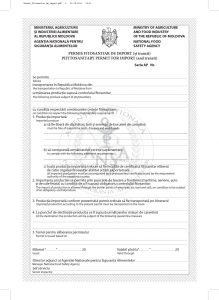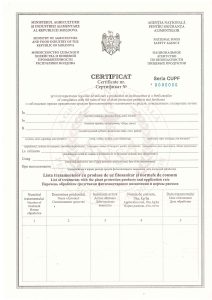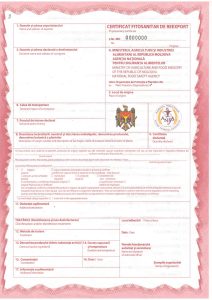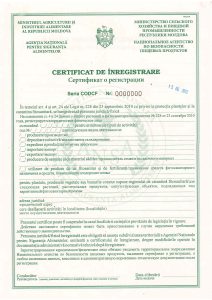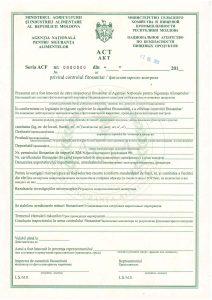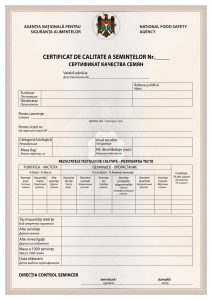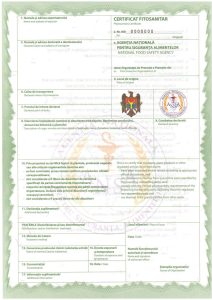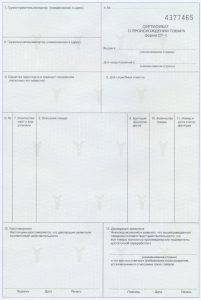Moldova aligns with the EU standards on quality control for fresh fruits and vegetables. The law on compliance control with quality requirements for fresh fruits and vegetables adjusts the field to European standards, increases product quality, protects consumer rights, and increases the volume of exports.
There are several types of certificates issued by the Moldovan state institutions:
Certificates of origin
Certificates of origin are confirmatory documents proving the origin of the goods. If the exporting country has signed any agreements with the importing country that provides for the preferential treatment of the commodity in the shipment process, the certificate of origin is the act that ensures such preferential treatment. Based on the international agreements signed by the Republic of Moldova, the Customs Institute offers three types of certificates of origin.
1. CT-1 certificate This act offers the possibility to pass all tax-free customs procedures in the economic block of the Commonwealth of Independent States (CIS). Due to the political and economic conflicts of the Republic of Moldova with the Russian Federation, only a part of the Moldovan products were exempt from customs duty, namely: 0806, 0810, 0811. In the rest of the CIS states, CT-1 form provides 100% commodity preference.
An example of the CT-1 form can be viewed here->
For the issuance of the CT-1 Form Certificate of Origin in accordance with the rules of the country of origin the goods must be obtained in the Republic Moldova under the following conditions:
a) in its entirety;
b) with the usage of products other than those referred to (a), provided that the goods undergo sufficient processing;
c) using materials originating in CIS Member States, provided that such goods undergo sufficient processing.
Each item in a consignment shipped must fulfill all conditions.
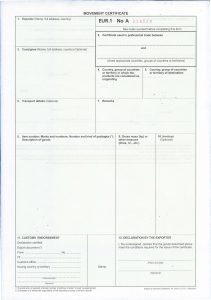
2. EUR -1 certificate. Like the CT-1 certificate, the EUR-1 certificate ensures passage of all customs clearance procedures except that it is valid for the European Union.
EUR-1 certified model can be viewed here->
In order to issue the EUR.1 certificate (according to the provisions of the protocols on the definition of “originating products” to the free trade agreements ratified by the Republic of Moldova, which provide proof of origin of this type of certificate) the goods must be obtained under one of the following conditions:
a) fully obtained in the Republic of Moldova;
b) should goods other than those referred above (a) have been used, such goods would undergo sufficient processing;
c) the use of materials originating in any of the Free Trade Agreements states (referred in §8 see EUR -1 Certificate), provided that such goods would undergo sufficient processing as per the terms of the agreement.
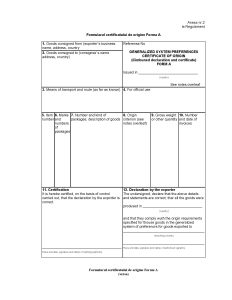
3. Form A Certificate
This certificate confirms the provenience but does not provide relief from customs duties. This type of certificate allows goods to be exported to the following countries: Australia, European Union, Canada, Japan, New Zealand, Norway, Turkey, Slovenia, and USA.
Form A Certificate can be viewed here->
In order to issue Form A Certificate (according to the requirements of the normative acts applicable to the preferential regime) the goods must be obtained in the Republic of Moldova under the following conditions:
a) in its entirety ;
b) with the usage of products other than those referred to (a), provided that the goods undergo sufficient processing;
Each item in a consignment shipped must fulfill all conditions.
Quality and phytosanitary certificates.
The phytosanitary certificate are issued to authenticate that the consignments containing plants, vegetable products or other regulated articles comply with the phytosanitary requirements specified for import and correspond to the certification declaration.
All exports of food products are accompanied by phytosanitary certificates confirming the consistency of the consumer goods. The phytosanitary certificate may be accompanied, at the request of the buyer, by a series of other certificates such as: certificate of conformity, safety certificate, quality certificate, etc. Below are some examples of certificates.
